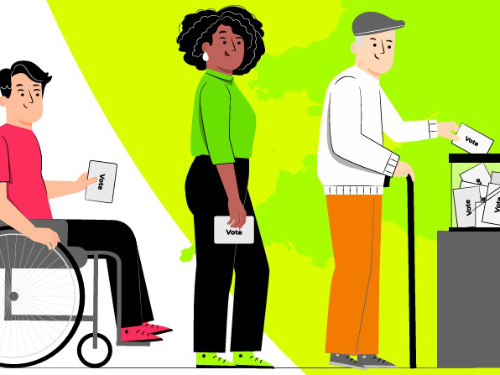
The below Council Motion has been written by the Migrant Democracy Project calling for residence based voting rights in England and Northern Ireland (this has already been introduced in Scotland and Wales fir local and devolved elections).
The 2021 Census revealed that 1 in 6 people living in England and Wales were born abroad. However across the country 1.2 million people do not have the right to vote in any elections (including local elections) and 4.4 million residents cannot vote in parliamentary elections.
Read the full What if everyone Could Vote report from the Migrant Democracy Project here.
Residence-based voting’ enables citizens to participate in elections in the locations in which
they are ordinarily resident. Residence-based voting has long existed in the UK for citizens from
Commonwealth countries who can immediately participate in Westminster Parliamentary
elections upon arrival. This was put in place in the middle of the twentieth century to reflect
the UK’s wide connections around the world. Residence-based voting has been introduced
in Scotland and Wales for local and national elections to the Senedd and Scottish Parliament
to enfranchise non-Commonwealth citizens.
The Elections Act 2022 introduced significant changes that disenfranchised people settling in the UK from most EU countries from 2021 onwards.
The below motion calls for simple, residence-based voting rights for all residents.
Please use the What if Everyone Could Vote report from the Migrant Democracy Project to localise the motion to your Council. Appendix 6 includes a list of the estimated number of voting age residents in each local authority unable to vote in local elections.
You can copy and adapt the Council Motion below:
Council notes the Elections Act is a major piece of national legislation with local implications for the residents of this local authority, including the use of mandatory photographic voter ID at the polling station, changes to overseas voting, and voting and candidacy rights of EU citizens.
According to the 2021 census, one in six usual residents of England and Wales were born outside the UK. They live, work, study, make use of public services, and call the UK their home. Many foreign-born residents of this local authority from EU and Commonwealth countries can vote in our local elections. However, over 1 million residents across England and Northern Ireland do not have a right to vote.
In [AREA NAME] alone XXXX voting-age residents were estimated to not be able to vote at all in the 2021 census.
Scotland and Wales have implemented residence-based voting rights where all residents with lawful immigration status have the right to vote in local and devolved national elections.
Council welcomes that all residents, no matter their nationality, call this local authority their home and bring significant value to the area – and that the voting and candidacy rights of EU citizens who entered the UK before 2021 will be maintained through the Elections Act.
Council is concerned that EU citizens who enter the UK from the 1st of January 2021 and are not covered by bilateral voting rights treaties (currently only active with Poland, Luxembourg, Portugal, and Spain) have lost their voting and candidacy rights in local elections. This has created an unequal situation where some EU citizens have the right to vote where others do not.
The complexity in voting eligibility will cause confusion and will reduce voter turnout in local elections amongst migrant voters, a group already under-registered compared to British voters.
A burden will be placed on Local Authorities managing the removal of a significant number of EU citizens from the electoral register. This may result in some being wrongfully removed from the electoral register.
The Council commits to:
- Write to the Secretary of State for Housing, Communities and Local Government and the relevant shadow frontbenchers requesting that the franchise for local elections be extended to all qualifying foreign nationals in England and Northern Ireland in line with eligibility criteria in Scotland and Wales.
- Write to the local Member of Parliament asking for their support in Parliament to see the right to vote extended to all residents in local elections.
- Deliver training to councillors and relevant officers on the changes brought by the Elections Act so that residents can be accurately informed about their voting rights.
- Work collaboratively with voluntary sector organisations in our local authority to reach residents about voter eligibility rules and how to vote.
- Continue promoting voter registration and photo ID requirements to residents at citizenship ceremonies, events, and other communication channels.